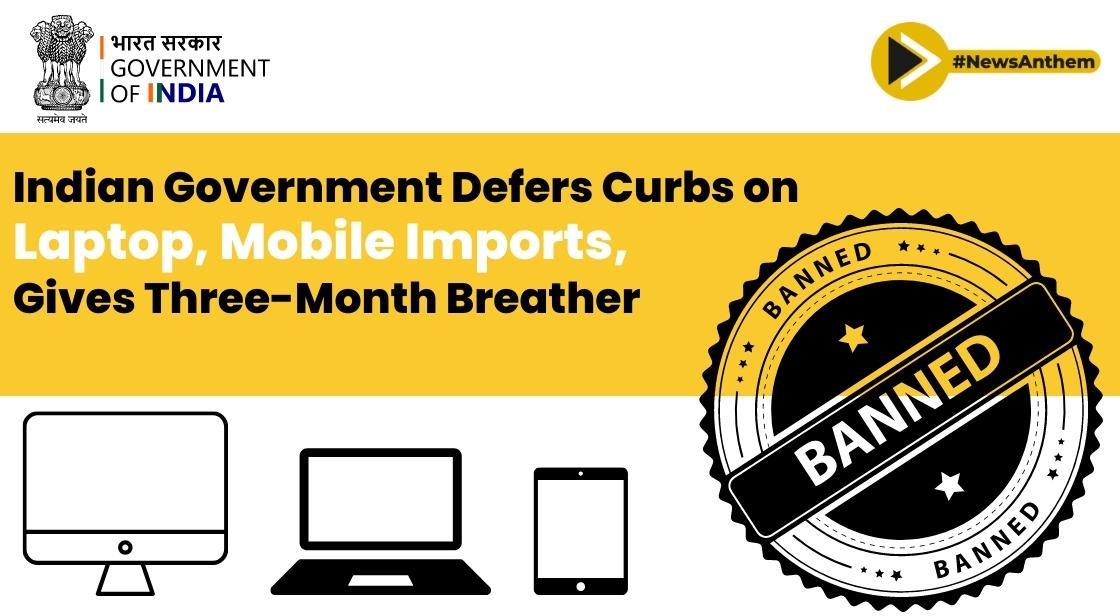Indian Government Delays Implementation of Import Restrictions on Laptops and Mobiles, Provides Three-Month Window

News Synopsis
In response to concerns surrounding import duty restrictions on laptops, mobile phones, and other IT hardware, the Indian government has announced that the new regulations will not be immediately enforced. A transitional period will be granted to ensure a seamless transition for the industry.
Buffer Period for Implementation:
Minister of State for Electronics and IT, Rajeev Chandrasekhar, clarified the government's stance, stating that a buffer period will be established before the regulations take effect. He shared this information on the social media platform X.
Delayed Implementation Deadline:
The Ministry of Commerce and Industry released a notification indicating that the enforcement of the new import rules for laptops and mobile phones will be postponed until October 31. Consequently, these regulations will come into effect on November 1.
Concerns Over Curbs: The announcement of import licensing requirements for laptops, tablets, and personal computers was met with apprehension, particularly regarding potential impacts on supply and pricing due to import restrictions. The measures are aimed at encouraging domestic manufacturing under the production-linked incentive (PLI) scheme for IT hardware.
Chandrasekhar's Justification:
Chandrasekhar defended the government's decision, highlighting the intention to safeguard and strengthen the domestic manufacturing ecosystem against the influx of cheap imports.
He emphasized that the objective is not to establish a "license raj" but to regulate imports to ensure the usage of trusted and verified systems in India's tech ecosystem.
Targeted Imports and Domestic Manufacturing:
The import restrictions specifically target goods originating from China, Korea, and Indonesia. The move is aligned with the government's commitment to promoting domestic manufacturing while ensuring the quality and trustworthiness of imported and domestically produced tech products.
Efforts to Avoid Supply Shortages:
To address concerns about potential supply gaps, the IT ministry assured that the issuance of licenses for importing laptops and tablets would be expedited. Licenses will be granted within two days and can be obtained online. Companies seeking licenses must provide details about the origin of consignments, the quantity of items, and past import history.
Similar Moves to Boost Domestic Manufacturing:
This move parallels a similar initiative undertaken by the Indian government last year to encourage domestic manufacturing of smart TVs through import restrictions.
Strengthening India's Tech Ecosystem:
Rajeev Chandrasekhar emphasized the rapid growth of India's digital product market and the government's commitment to ensuring trustworthy hardware and systems. The goal is to reduce import dependency and increase domestic manufacturing while upholding trusted and verified systems in the tech ecosystem.
Conclusion:
The Indian government's decision to delay the implementation of import restrictions on laptops and mobile phones reflects a balanced approach towards promoting domestic manufacturing while addressing industry concerns.
By providing a buffer period and expediting the issuance of import licenses, the government aims to mitigate potential supply shortages and ensure a smooth transition for businesses.
The focus on regulating imports to maintain trusted and verified systems within the tech ecosystem highlights the government's commitment to fostering a robust and reliable domestic technology industry.
As India's digital product market continues to grow, these measures aim to strike a harmonious balance between domestic manufacturing and global technological standards.
You May Like









